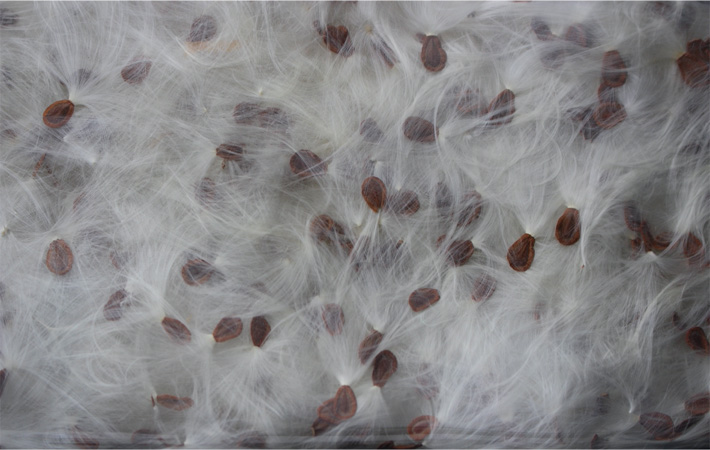Vegeto has announced the launch of a high-performance milkweed insulation material. The new innovative product represents a preferred, eco-friendly solution for the outdoor clothing and equipment market, notably jackets, handwear and sleeping bags. Vegeto is a Canadian leader in the sustainable production and processing of plant textile fibres.
The non-woven laminated textile insulation is a mix of milkweed and kapok fibres, and a biopolymer made from corn starch. Testing conducted at an independent laboratory (CTT Group) confirms the product’s exceptional thermal insulation properties. The CLO value ranges from 2.5 to 4.5, depending on the weight of the chosen product (100 g/m2, 150 g/m2, 200 g/m2 and 250 g/m2). This weight range meets the insulation needs for mild spring weather as well as for winter’s frigid temperatures, the company said in a press release.
Although widely common in Canada, milkweed and its virtues remain rather unknown. unknown. Vegeto works with Canadian farmers wishing to harvest a stable milkweed crop meeting textile-grade standard. Growing demand for the indigenous plant leads the company to consolidate more and more partnerships with farmers to ensure long term supply.
Vegeto has announced the launch of a high-performance milkweed insulation material. The new innovative product represents a preferred, eco-friendly solution for the outdoor clothing and equipment market, notably jackets, handwear and sleeping bags. Vegeto is a Canadian leader in the sustainable production and processing of plant textile fibres.
“This new insulation material fills a gap in the textile industry: a plant-based, eco-friendly insulation textile that makes no compromise on performance. Our alternative, conceived and produced in Canada, does not rely on the usual model of using animal-sourced or petroleum-based products; we are sowing the seeds of change for the entire garment and textile industry. Study of the milkweed fibre’s properties revealed that its tubular form makes it an excellent thermal insulation material. The hollow part of the fibre stores air and maintains temperature. It’s this natural characteristic, which synthetic materials try to reproduce, that inspired us to create our milkweed insulation textile,” Ghyslain Bouchard, general manager of Vegeto said in a statement.
When choosing a textile insulation material, selection is limited to synthetic products, mostly composed of petroleum derivatives, or animal-sourced materials. From production to their end of use, synthetic materials have harmful effects on the environment. To reduce a product’s impact at the end of its useful life, Vegeto uses plant-based components that will break down into industrial compost at the end of the garment or accessory’s useful life.
Fibre2Fashion News Desk (GK)





